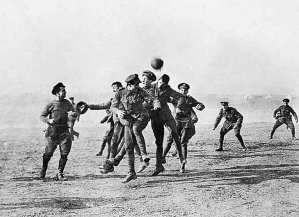
Moving into the first bitter winter of World War I, battles across Europe had claimed the lives of nearly one million and a war that was predicted to end in few weeks was just getting started. And as snow blanketed Flanders Field near Waregem, Belgium, men deemed enemies due to war chose to lay aside their differences and their weapons.
It was one century ago today - Dec. 24, 1914.
French, German and British soldiers had been slaughtering each other by the tens of thousands on the Western Front. On that clear Christmas Eve, they were surrounded by their dead comrades, fighting for warmth and survival, and longing for home.
Swimming in a sea of white and stationed in muddy trenches, an unexpected silence was broken by an almost forgotten sound. A chorus of Silent Night began to enter the cold night air in the no-man's land between opposing soldiers, and something incredible took place.
"It was a beautiful moonlit night, frost on the ground, white almost everywhere: and at about 7 or 8 in the evening there was a lot of commotion in the German trenches and there were these lights -- I don't know what they were. And then they sang, "Silent Night" - "Stille Nacht." I shall never forget it, it was one of the highlights of my life. I thought, what a beautiful tune," Pvt. Albert Moren, a British soldier, wrote in his journal.
Just five months into the Great War, and much to the frustration of their commanders, soldiers cautiously began to emerge from damp and soggy dugouts, and one-by-one committed the ultimate war time sin - they recognized each other as human beings.
Cpt. Robert Hamilton of Britain's 1st battalion Royal Warwickshire wrote, "I am told the general and staff are furious - but powerless to stop it."
For brothers Frank and Maurice Wray, of the London Rifle Brigade, the Christmas tune from the Germans was immediately recognized, something they spotted as 'common to both nations.'
"Quite understandably a wave of nostalgia passed over us," they wrote later.
At dawn, a German soldier called out, "We good. We no shoot," and as the Wrays wrote: "And so was born an unofficial armistice."
The temporary peace allowed for the recovery and burial of the dead, and men exchanged gifts of German sausages and cigars, Maconnochie's tinned stew and Wills' tobacco, family photos and London newspapers. And perhaps with great apprehension they reached out their hands in friendship.
Just one month prior, then 39-year-old Winston Churchill, Britain's First Lord of the Admiralty, wrote to his wife about the dilemma of the war.
"What would happen, I wonder, if the armies suddenly and simultaneously went on strike and said some other method must be found of settling the dispute!" he penned.
And for one miraculous night, soldiers on opposing sides essentially did just that. According to Piet Chielens, curator at the In Flanders' Fields Museum in Ypres, Belgium, about 30 similar events took place throughout the country and across the Western Front.
But even amid the truce, the reality of war remained. British general Walter Congreve wrote to his wife on Christmas Day 100 years ago. He told her of the German's best shot and where he was positioned in the field.
"They say he's killed more of our men than any other 12 together, but I know now where he shoots from, so I hope we down him tomorrow," Congreve wrote.
By the following Christmas, the truce was banned under threat of a court martial for any soldier on either side who dared to fraternize with the enemy.
But for many, the Christmas truce from a century ago remains a symbol of the humanity that emerged on a cold evening in the first months of a war that would claim the lives of more than 16 million military and civilian personnel.
Ben Adams, councilor at the Staffordshire County Council Archives where Congreve's letter was discovered, called it a moving piece of history detailing an incredible event.
"This was in the middle of the most horrendous war imaginable, the most horrendous circumstances imaginable, so for those men to have an opportunity to almost live a normal life, chat and meet with other men in the way that they would hope to do outside of war, but knowing within 48 hours it's back to the gruesome business of trying to win - it's quite extraordinary," Adams said.
The truce inspired the British supermarket chain Sainsbury's official Christmas ad for 2014, 'Christmas is for Sharing,' made in partnership with The British Royal Legion, and a tribute to the events that took place in Flanders Field 100 years ago.






